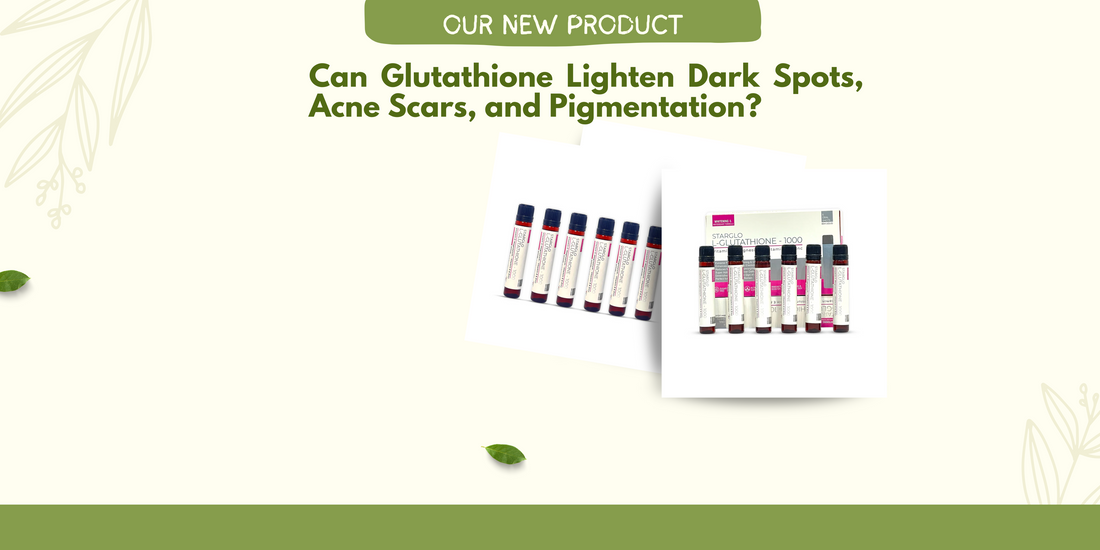
Can Glutathione Lighten Dark Spots, Acne Scars, and Pigmentation?
Share
Glutathione has gained significant attention in the skincare world as a potential solution for various pigmentation issues. This powerful antioxidant, naturally produced by our bodies, is being marketed as a miracle ingredient for achieving brighter, more even-toned skin. But does it really work for dark spots, acne scars, and pigmentation?
How Glutathione May Affect Skin Pigmentation
The theory behind glutathione's skin-lightening effects lies in its ability to:
- Inhibit tyrosinase activity: This enzyme is essential for melanin production, the pigment responsible for skin color
- Convert eumelanin to pheomelanin: Shifting from darker to lighter pigment types
- Provide antioxidant protection: Reducing oxidative stress that can trigger excess melanin production
- Support cellular repair: Potentially helping with overall skin health and regeneration
Forms of Glutathione for Skin Care
| Form | Method | Effectiveness | Safety | Cost |
|---|---|---|---|---|
| Oral Supplements | Pills/Capsules | Limited evidence | Generally safe | Low-Medium |
| IV Injections | Intravenous | Faster results reported | Requires medical supervision | High |
| Topical Creams | Direct application | Variable results | Safe for most users | Medium |
| Sublingual Tablets | Under tongue | Better absorption than oral | Generally safe | Medium |
What the Research Says
While glutathione shows promise in laboratory studies, clinical evidence for skin lightening in humans is limited. Most studies have been small-scale or conducted on specific populations. Some research suggests modest improvements in skin brightness and reduction of pigmentation, but results vary significantly between individuals.
Key findings from studies:
- Some participants showed 20-30% reduction in melanin index after 4-12 weeks of use
- Effects were more noticeable in people with darker skin tones
- Combination with vitamin C may enhance results
- Results typically take 2-3 months to become visible
Important Link: Glutathione Results: 5 Things I Wish I Knew Before Starting
Realistic Expectations
It's important to set realistic expectations when considering glutathione for skin concerns:
- Dark spots: May see gradual lightening over several months
- Acne scars: Limited effectiveness; works better on post-inflammatory hyperpigmentation than actual scarring
- Overall pigmentation: Some users report more even skin tone, but dramatic changes are uncommon
Real User Experience
"I started taking petalez glutathione shots six months ago after struggling with stubborn dark spots from old acne. I was skeptical at first, but I wanted to try something natural before considering stronger treatments.
After about 10 weeks, I started noticing that my skin looked a bit brighter overall. The dark spots on my cheeks weren't completely gone, but they were definitely less noticeable. My friends started asking if I was using a new foundation!
The best part was that my skin felt healthier somehow - less dull and more radiant. However, I should mention that I also started using vitamin C serum and being more consistent with sunscreen, so I can't say it was just the glutathione.
Would I recommend it? Yes, but with realistic expectations. It's not a miracle cure, but it did help improve my skin tone gradually. Just don't expect overnight results - this is definitely a long-term commitment."
Safety Considerations
While glutathione is generally considered safe, it's important to:
- Consult with a healthcare provider before starting any supplementation
- Be aware of potential side effects like stomach upset or skin reactions
- Choose reputable brands with third-party testing
- Monitor your skin's response and discontinue if irritation occurs
Conclusion
Glutathione may offer some benefits for skin pigmentation issues, but it's not a guaranteed solution for everyone. The evidence is still emerging, and individual results vary widely. For best results, consider it as part of a comprehensive skincare routine that includes sun protection, proper cleansing, and proven ingredients like vitamin C, retinoids, or hydroquinone.
If you're dealing with significant pigmentation issues, consulting with a dermatologist remains the most reliable path to finding effective treatments tailored to your specific skin concerns.
FAQs on Glutathione for Pigmentation, Dark Spots & Acne Scars
Q1: Does glutathione really lighten dark spots and pigmentation?
Yes, glutathione may help lighten dark spots and pigmentation by reducing melanin production and offering antioxidant protection. However, results are gradual and vary from person to person.
Q2: How long does it take to see results with glutathione?
Most people notice visible improvements in skin tone within 8–12 weeks of consistent use. With Petalz glutathione shots, some users report faster brightness results when combined with vitamin C and sunscreen.
Q3: Is glutathione effective for acne scars?
Glutathione works best on post-inflammatory hyperpigmentation (dark marks after acne) rather than deep pitted scars. It can improve overall skin brightness but may not completely erase scars.
Q4: Can glutathione permanently whiten skin?
Glutathione lightening effects are not permanent. If you stop taking it, melanin production may return to normal, and your skin could gradually darken again. Maintenance and sun protection are essential.


